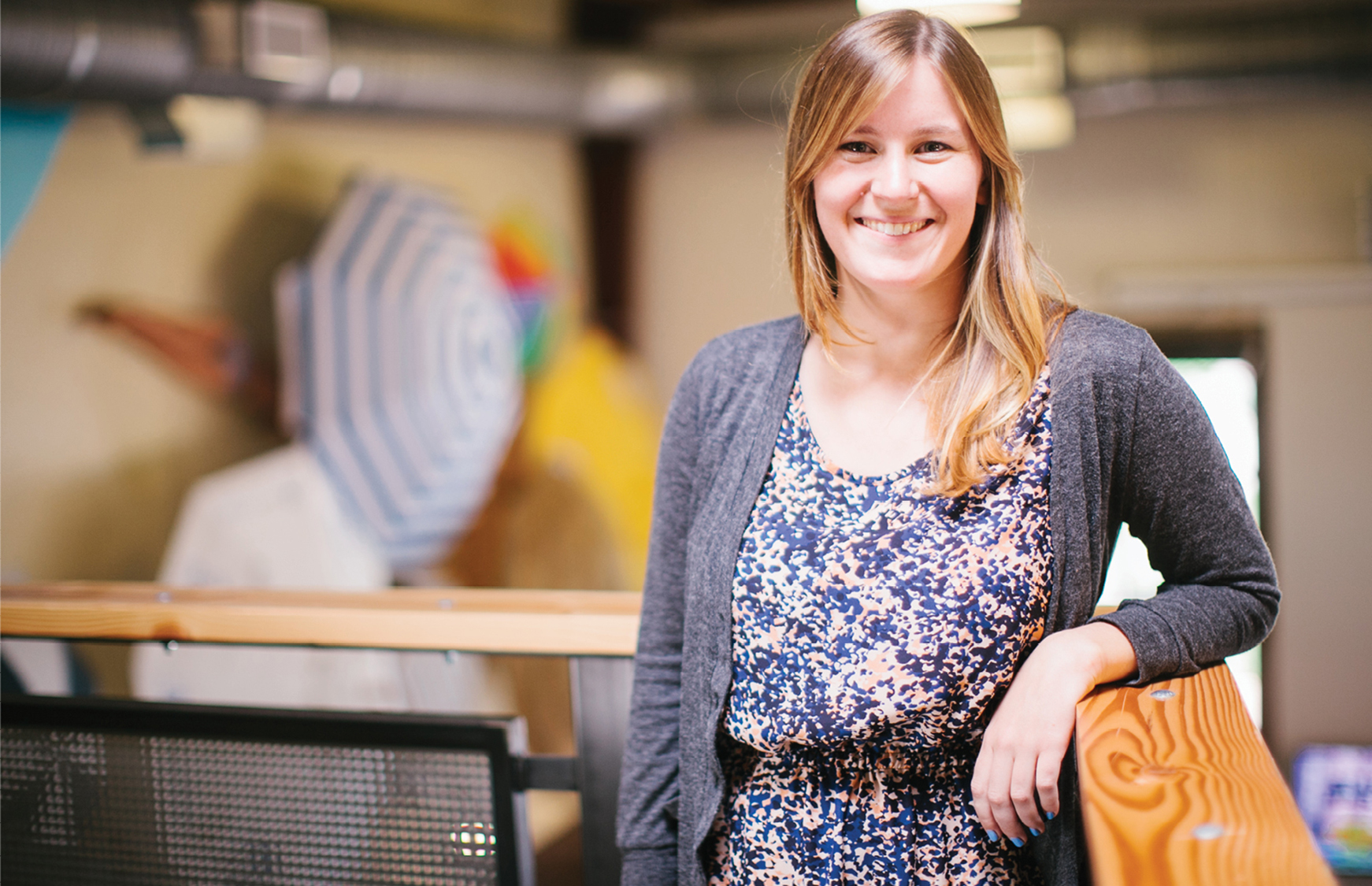Like a lot of us, Julie Jarzemsky went into college unsure of which major to claim. After searching for the perfect fit, she ultimately took her advisor’s advice and signed up for a programming class. Today, just months after graduating with a degree in Computer Science, Julie works as a Software Engineer for HomeAway, a tech start-up in Austin, where she started as an intern.
Although Julie is one of the lucky few to land their dream job right out of college, that doesn’t mean that she was exempt from the learning curve most young professionals face post-graduation. The transition from intern to full-time employee often is a struggle, and Julie had to work through her fair share of transitional difficulty. Fortunately, Julie had the support of her co-workers in a company she loved, plus the sharp, analytical mind of a programmer to help overcome the situation.
Though computer programmers are hot commodities in this day and age, keeping up with the ever-changing world of technology doesn’t come easily. Working in the field means there’s always something new to learn. This, Julie says, is both exciting and daunting all at once. Though she’s just starting out in her field, she’s been fortunate enough to learn valuable lessons straightaway—things like having an industry niche and communicating well with a team. It’s all proof of this young pro’s breadth of knowledge well beyond her years.
EDITOR'S NOTE: Julie is now a Career Contessa Mentor! Click here to book personalized career advice with her.
Her Starting Point
Many people find the transition between college and “real life” a bit daunting. Can you tell us about your journey between the two? What was your first job post-college?
I’m still going through the transition from college to “real life” as I just graduated four months ago, but it’s been smooth. I knew I would need time for the job search, so during my final semester I took a lighter course load. I connected with a lot of tech companies at University of Wisconsin’s engineering career fair. I interviewed on-site in New York, San Francisco and Chicago, so I was glad that I had budgeted the extra time for traveling and decision-making.
I decided to work in Austin, Texas at HomeAway, the company where I had interned the previous summer. I knew from experience that it would be an enriching and fun place to work. From the start, I got a lot of support and feedback from my team. This helped with the learning curve of real-world web development, which differs a lot from the traditional computer science projects that I worked on in school.
When did your passion for computer programming first begin, and what steps did you take in order to establish yourself as a pro?
I’ve always enjoyed math and puzzles, but I also have a creative side and I wanted to do something related to design or art. I went into college searching for a major that combined the two. An advisor recommended I try a programming class, and when I did it clicked, so I continued taking computer science courses. I loved the project-based structure of the classes because it allowed me to learn by doing and obtain hard skills that I knew I could use after graduating. It was just the blend of creativity and logic I was looking for.
To broaden my skills, I took a variety of courses, from algorithms to entrepreneurship. Once I met like-minded computer science students, I learned the importance of networking and was encouraged by my peers to attend career fairs and tech conferences. Attending engineering career fairs gave me perspective on what employers were looking for and helped me choose upper-level courses accordingly. It also gave me a lot of practice with interviewing and helped me find an internship that would provide meaningful experience before I graduated.
Why HomeAway? What drew you to the company as an intern and then what convinced you to stay? Was the transition from intern to employee difficult?
When I interviewed for the internship, I could see that it was a lively place to work. It’s a young company, there’s a lot of collaboration between developers and they have a solid internship program where you go through training and have the rest of the summer to work on a real project within the company. Plus they have a great office in downtown Austin.
The project I was assigned for the internship matched my interests really well: I created an application that made an interactive diagram of the website’s domain so that developers could better understand its structure. I discussed the design and usability with another engineer and coded features to manipulate the diagram. I could see that my positive first impressions of the company were true: developers really do collaborate and bounce ideas off of each other there, and participating in that was fun. I came back full-time because I wanted to continue working on interesting projects, loved the people I worked with and wanted to live in Austin.
I’m currently on a front-end team that focuses on coding designs for user interfaces that people use when searching for a vacation rental. Most of the tools used for front-end—like Javascript, Jquery and CSS—are new to me, so it’s taken a lot of learning. I actually chose the team for this reason, to learn front-end and get more involved in design. Other than that, the transition has been manageable. I came in with exposure to the frameworks used at HomeAway, and I received a lot of support from my team when I was getting started.
How has your college degree prepared you for your current endeavors? Do you recommend that people interested in computer programming embark on a streamlined path or explore a little more?
It depends on what you’d like to do. Most of my computer science coursework involved programming in Java. It was great for gaining programming experience and learning algorithms, but the course options didn’t include web development. Right now there are so many ways to learn how to program that it really just depends on the person. I thrive on structure and am glad that I learned programming in school, but now that I’m out of school I’ve been exploring more on my own with web tutorials. However you learn, I think it’s vital to have a project going so that you have practice applying the concepts you learn.
Learning computer science in school also provided me access to activities and connections that wouldn’t have been possible if I had learned independently. I took a service-learning course and got to teach kids how to program games in an after-school club, which later led to a volunteer opportunity in an all-girls CS club. University of Wisconsin sent me to Grace Hopper, a conference for women in tech, where I learned about some amazing research, such as one PhD student’s app to type braille on a touch screen, heard stories from women who started their own companies and saw Sheryl Sandberg, COO of Facebook, speak. I participated in a club for women in CS, which connected me with other CS undergrads and PhD students at UW. I also did some design work in my free time for a student magazine. So, beyond the preparation I got from my classes, the out-of-class activities I did motivated me and opened my mind to the many paths I could take.
Her Big Break
How do you stay organized? What tools/resources do you utilize (i.e. iPhone, apps, etc.)? What skills are essential to do your job well?
I use an app that one of my coworkers recommended to me on my first day, Growly Notes, to keep track of tips and tricks that I pick up along the way. It saves me time looking for solutions. My team uses a Kanban board, which keeps track of who is doing what and where projects are on the development cycle.
We work on traveler-facing interfaces on the site, so I keep design and usability concerns in mind. I have to problem-solve creatively, communicate with other developers, manage my time and be a quick learner, since things move so fast in this field.
If we had the chance to peek at your schedule, what would an average day look like?
Every morning my team has a “stand-up” meeting, where we each say what we worked on the day before and what we’ll be doing today. It helps everyone sync up at the start of the day. After that, I work independently, stopping to ask questions every so often. I solve defects within the site, move around layouts, code new features, test code I’ve written and work through feedback from others. I move away from my desk to bounce ideas off of people and ask questions, and we always get lunch together in the afternoon. I generally keep a standard eight-hour schedule, but it varies day to day.
Was there a particular moment when you felt like your career was turning the corner towards success?
I’m very fresh in my career still, but so far, things have been going really well. Simply choosing to study computer science set me up for success, since programmers are so in demand right now. Landing a good internship was an important step for me. I took as many interviews as I could to practice for the ones I wanted to ace. Usually interviews involve coding out solutions on a whiteboard in front of another engineer, so it takes some getting used to. I noticed myself getting better as time went on, and soon I started getting offers. Once I had that experience under my belt, employers were even more interested in interviewing me.
What has been the biggest challenge for you, career-wise?
Keeping up with the rapidly changing industry is a big challenge. In tech, there is always something new to learn and it’s necessary to prioritize what is most interesting and useful to spend time on. Currently, I’m focusing on front-end since design interests me as well as programming. I had the privilege of joining a team at HomeAway that is UI-focused, despite my lack of experience in the area, so I’ve been lucky enough to do learning on the job. I ask a ton of questions and aim to take on projects that will immerse me in problems I haven’t dealt with before. Fortunately, the challenge of always having something to learn also is what makes it engaging.
Her Perspective
How do you handle work/life balance?
Since I just graduated, having my nights and weekends all to myself still feels like a treat. Sometimes I’ll stay at work late, but only if I’m immersed in a problem that I really want to solve, so it doesn’t bother me. I tend to keep my weeknights laid-back. After work I go running to unwind, or see a show at one of Austin’s many live music venues.
What skills are essential to working as a computer programmer? Do you think having an industry niche is important?
Logical thinking and the ability to come at a problem from several different angles is key. There are a few programming languages that I have to know to do my job, like Java and JavaScript, as well as general programming practices, like thorough testing of code. The pace of tech makes it important to be willing to constantly learn new things. Communicating with others also is important, since we’re all working within the same areas of the site. I have to be proactive and ask questions when I’m unsure of something, particularly in the position I’m in now.
I think having an industry niche is very important. Many developers aim to be “full stack,” meaning they understand and could work in any layer of the software, from database to user experience. Good developers have a mastery of a particular layer, but also understand how the code they write affects other facets of the software.
Translating passion into a career is tough. What advice would you give to women trying to figure this out?
Try new things! Eventually you will fall on something that clicks. I never imagined that I would go into software engineering, but being open to taking a programming course in college allowed me to discover that it was a good fit. Get advice from people you trust or who may have insights into options you haven’t considered before.
And finally, what do you wake up looking forward to? What’s next for your career?
I’ll be building programming experience and getting a solid understanding of UI programming for the near future. Usability and user experience interest me, so I’m aiming to make those my specialties. I look forward to all of the possibilities to grow in the field and hope to do something more design-oriented or possibly move into product management later on.
I’d also like to work on something that gets girls more interested in programming from a young age, whether it’s through volunteering or in my career. There’s still a huge gender gap in the field. I was lucky to try programming out in college, but if I had been introduced to it earlier I could have better narrowed my interests and had more experience by now. In college, I volunteered teaching kids programming with Scratch, a tool developed by MIT for kids to program animations and games. I’d like to pursue something similar to that in the future.
EDITOR'S NOTE: Julie is now a Career Contessa Mentor! Click here to book personalized career advice with her.
You May Also Like
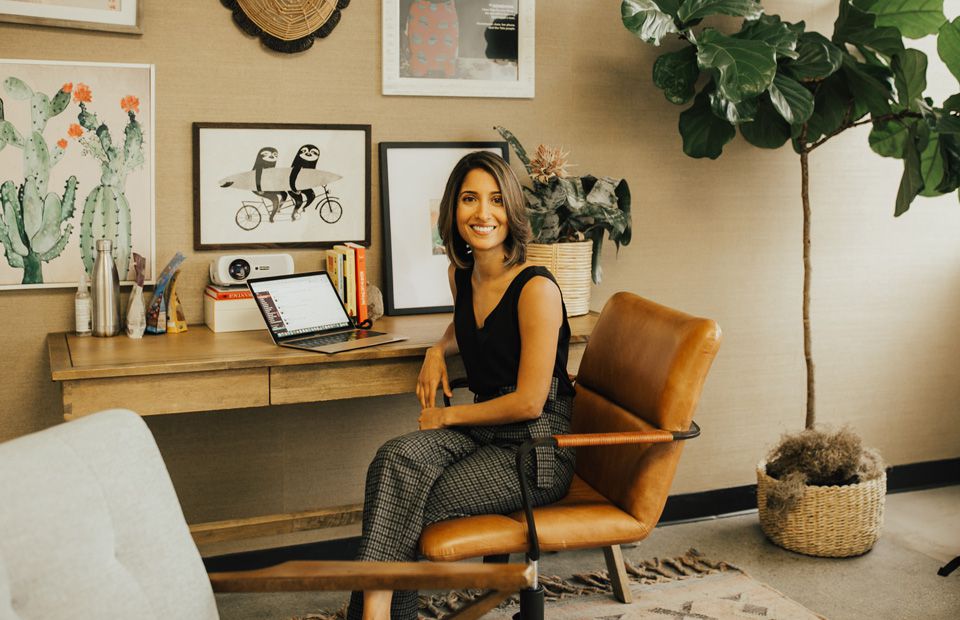
Technology
A Tech Founder on Why Being an Outsider Is a Strength
"I actually think most successful founders are rebels, of a sort. We’re trying to do new things and take on entrenched systems or ways of thinking. What makes me and our company different is that we’re outsiders."
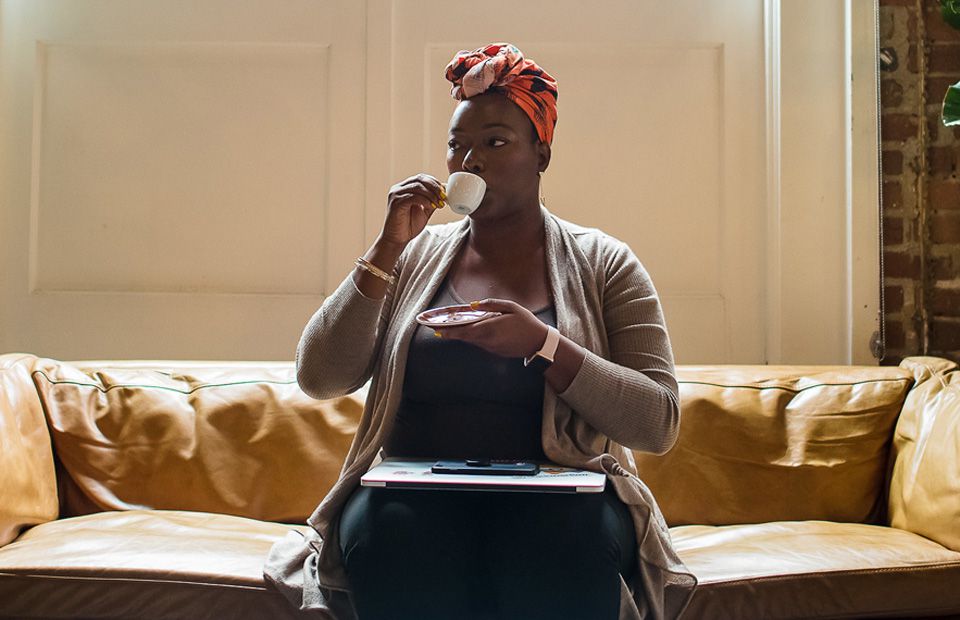
Technology
Omoju Miller—Tech Veteran, Leader, and Volunteer Advisor to the Obama Administration—on The Crucial Role of Creativity in the Tech Industry
"If you are in an environment where you feel marginalized, leave. Don’t try to change it. Go and look for a place that sees you and lets you be you."
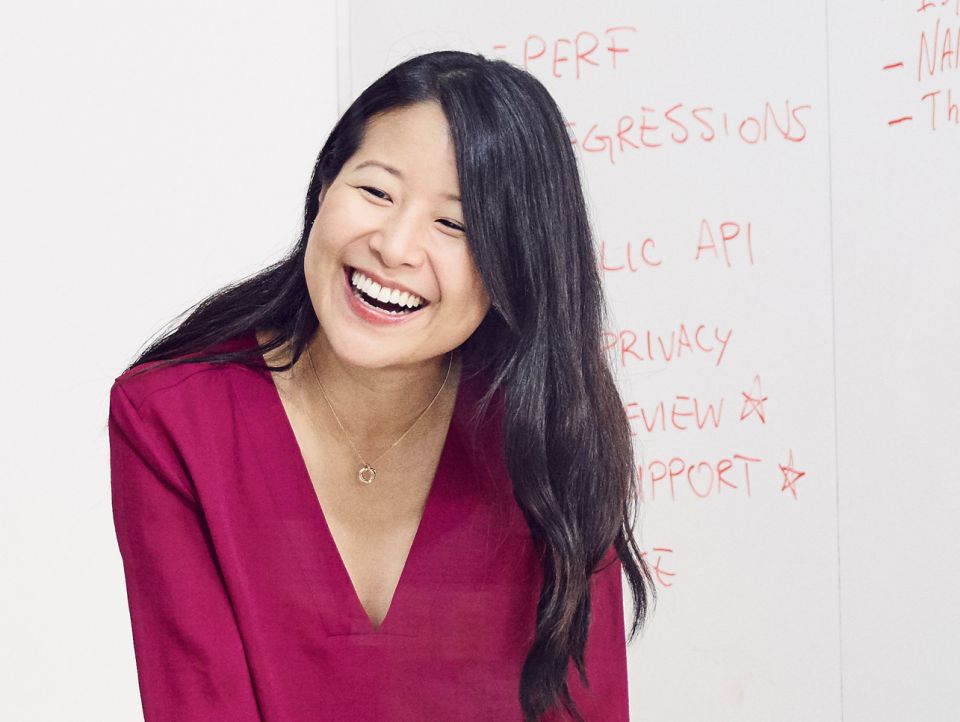
Technology
Sharing Stories as a Software Engineer
We sat down with Apple software engineer Emilie to learn about her day-to-day working at Apple along with what it takes to run the perfect meeting and her favorite ways to unwind.
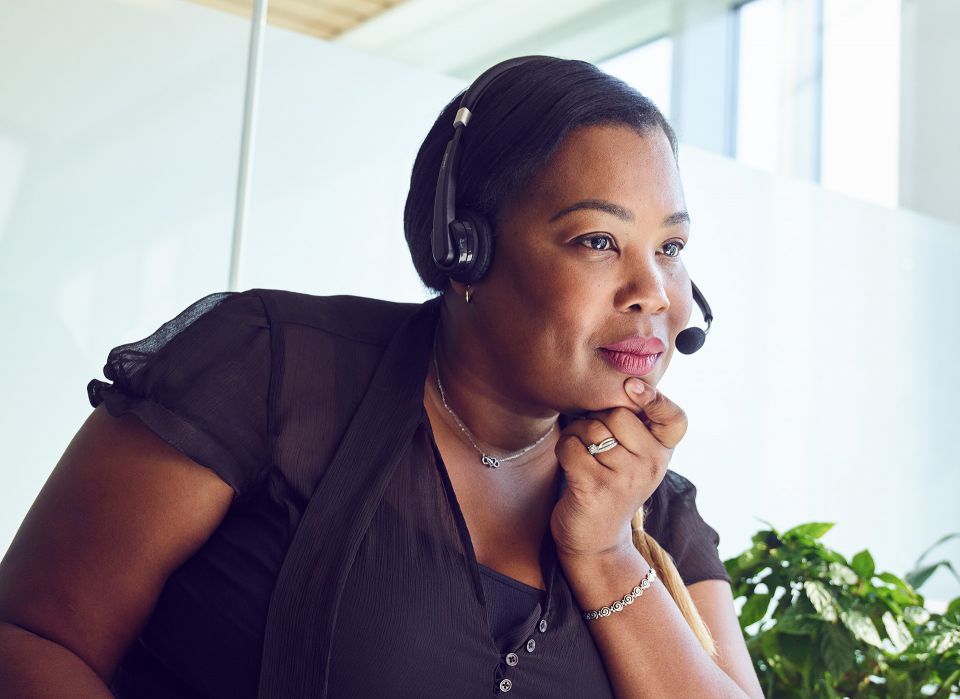
Technology
Creating Impact with Apple
We sat down with Apple's Senior Developer Partner Relations Advisor, Cris, to learn about what it takes to create a lasting impact within a large company. She shares a typical day in the life, her favorite book recommendations, and her top four tips to running a meeting.
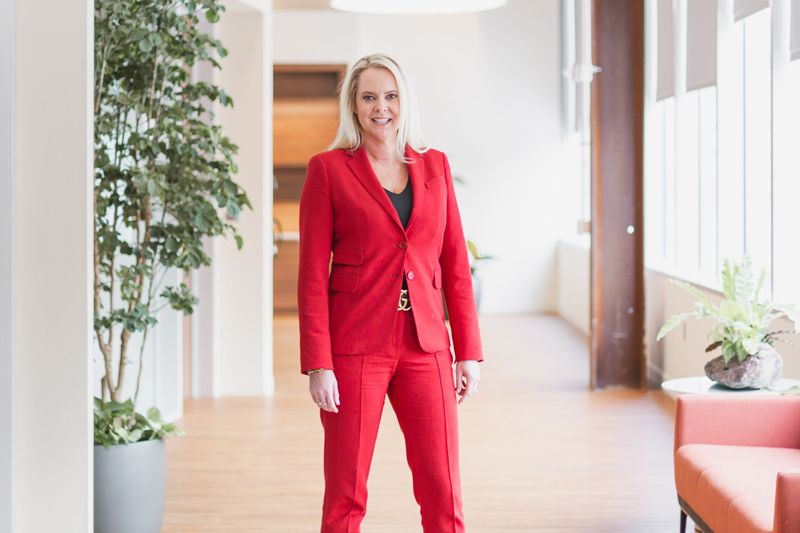
Technology
Salesforce’s Senior Vice President of Sales on Unconscious Bias, Failure, and Innovative Leadership
"Do not be afraid to fail, just bring your best self to the table."
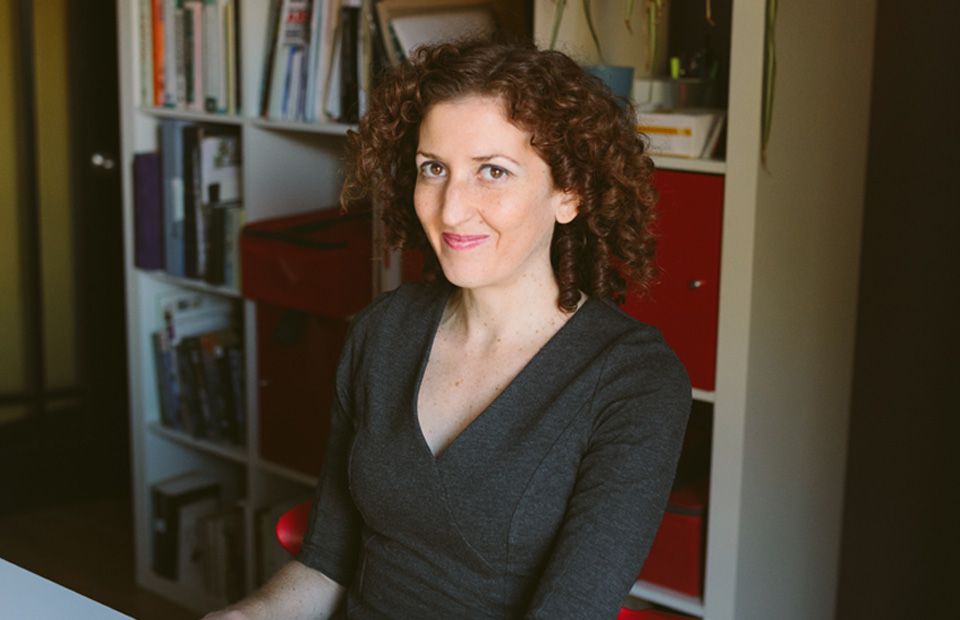
Technology
A Director of Engineering on Tech + Leadership
"I don’t believe in 'having it all'. If you spend more time on one thing, then you spend less time on another thing. All we can do is make choices on how to spend our time."
Get the Best Career Advice Delivered To Your Inbox
Join our newsletter to stay in the loop.
